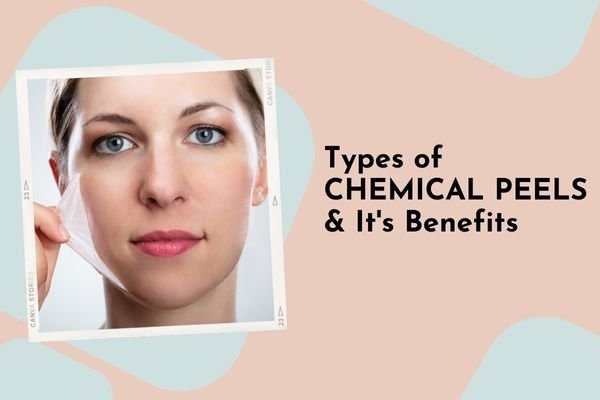Chemical peel, also referred to as chemexfoliation or derma peeling, is a clinical procedure that
utilizes plant-based chemical solutions to exfoliate and rejuvenate the skin. Tailored to the
specific needs of each client, dermatologists recommend peels with varying strengths. These
can include superficial peels, which target the outermost layers of the skin, or deeper peels that
penetrate multiple microlayers for more comprehensive results.
How chemical peels work?
Chemical peels work by applying a chemical solution to the skin, which causes controlled
exfoliation and removal of the outer layers. The specific type and strength of the chemical peel
will determine the depth of exfoliation.
The chemical solution used in a peel typically contains ingredients such as alpha hydroxy acids
(AHAs), beta hydroxy acids (BHAs), trichloroacetic acid (TCA), or phenol. These solutions work
by breaking down the bonds between dead skin cells, encouraging their shedding and revealing
fresh, new skin underneath.
The depth of the peel determines the extent of skin exfoliation and the results achieved.
Superficial peels target the outermost layer of the skin (epidermis), while medium and deep
peels can reach the deeper layers (dermis). Deeper peels provide more significant results but
also require more downtime and carry a higher risk of side effects.
After a chemical peel, the skin may appear red, sensitive, and may undergo a peeling process
as it heals. This process stimulates the production of new collagen and elastin, leading to
smoother, more youthful-looking skin. Chemical peels can address various skin concerns,
including fine lines and wrinkles, acne, hyperpigmentation, sun damage, and uneven skin
texture.
It is important to consult with a qualified dermatologist or skin care professional who can assess
your skin type, concerns, and recommend the most suitable type and strength of chemical peel
for your specific needs.
Types of Chemical peeels
Chemical peels utilize a range of chemical solutions to effectively remove the outer layers of
dead skin, revealing healthier and more youthful skin beneath. Here are the essential types of
chemical peels:
Light chemical peels:
Light peels are the mildest form of chemical peels, employing gentle acids such as alpha
hydroxy acids (AHAs) and beta hydroxy acids (BHAs). They work by exfoliating the skin’s
surface, addressing concerns like acne, fine lines and wrinkles, sun damage, uneven texture,
and skin tone.
Medium chemical peels:
Medium peels involve the use of stronger solutions like trichloroacetic acid (TCA) or Jessner’s
solution. These peels penetrate deeper into the skin, targeting moderate wrinkles, sun damage,
age spots, freckles, and dark patches. They provide more significant results compared to light
peels.
Deep chemical peels:
Deep peels are the most potent type of chemical peel and typically employ phenol or
trichloroacetic acid (TCA). These peels penetrate deeply into the skin, effectively addressing
deep wrinkles, severe sun damage, and age spots. They can also help reduce the appearance
of scars and other skin irregularities.
It is important to note that the depth and strength of the peel should be determined by a
qualified dermatologist or skin care professional, taking into account your specific skin concerns
and condition. Chemical peels can be a valuable tool in rejuvenating the skin and achieving
desired improvements in its appearance.
Benefits of Chemical Peels
Acne Control: By eliminating excess sebum, dead skin cells, and impurities, chemical peels
help control acne breakouts.
Smoother Skin Texture: Chemical peels promote healthy skin rejuvenation, resulting in a
smoother and more refined skin texture.
Complexion Improvement: Dark spots and discoloration are reduced, leading to an improved
complexion.
Firming and Toning: Chemical peels stimulate the production of collagen and elastin, leading
to firmer and more toned skin.
Correction of Hyperpigmentation: Chemical peels effectively address post-inflammatory
hyperpigmentation (PIH) associated with conditions like acne.
Overall, chemical peels can be safe and effective when performed by qualified professionals
following proper protocols. It is crucial to have a thorough consultation with a trusted
professional to understand the benefits, risks, and expected outcomes of the procedure based
on your individual circumstances.
At Dermacure, Dr. Sahitya Reddy and her staff provide up-to-date skincare solutions to
patients. Our Clinic specializes in conditions affecting skin & hair Solutions. Our goal is
to provide all the care that you need when you’re experiencing these kinds of problems.
We want to make it easy for you to access the best quality treatment and support in
rajamundry. Call us to book an Appointment 7799-777-573
Address: First floor, above Bank of Baroda, Prakash Nagar, Rajahmundry
